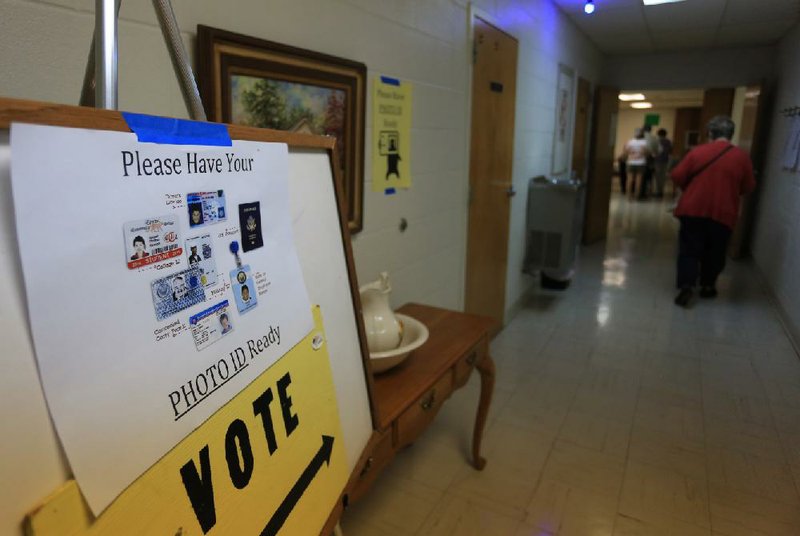Pulaski County Circuit Judge Tim Fox on Friday formalized his findings that Arkansas' voter-identification law is illegal because lawmakers didn't properly approve it.
Fox announced his decision at a May 2 hearing and filed it in writing Friday.
Secretary of State Mark Martin responded to the filing with an immediate appeal to the state Supreme Court.
Fox has suspended his ruling, which would have blocked the state from enforcing the law, until the high court can decide the issue.
When the Arkansas Supreme Court will consider the question is not clear. Martin did not ask for an expedited decision, and the justices will begin their summer vacation, which lasts about six weeks, at the end of June.
Fox has not addressed the merits of the identification requirement itself but described the law's intent of eliminating or reducing voter fraud as a "positive thing and a legitimate goal" for the Legislature.
The law went into effect Jan. 1, and this week's statewide primary and judicial elections were the first time photo identification was required to vote in a statewide race. There are as many as four elections possible before the Nov. 4 general election -- most immediately is the June 10 primary runoff.
Article 3 of the Arkansas Constitution puts only four restrictions on voter qualifications -- requirements on age, citizenship, residency and registration, Fox writes.
Amendment 51 governs the registration process. The General Assembly has the authority to set requirements for the process under Amendment 51, the judge ruled.
But Fox ruled that the Legislature, which overrode a gubernatorial veto to enact the identification law, did not add it to the state constitution.
To amend the constitution, lawmakers needed to approve the law with a two-thirds majority, Fox stated in his ruling. They did not meet that benchmark in any of their votes, he said.
Beebe warned that the law was unconstitutional when he vetoed the measure. The identification law was first passed the Senate 22-12 and 51-44 in the House. The veto-override vote was 52-45 in the House and 21-12 in the Senate.
Fox also found Act 595 of 2013 to be unlawful because of the timing of when voters must show identification -- directly at the moment the vote is cast.
The timing of the demand amounts to a registration restriction imposed after the deadline set by Amendment 51 for voters to have registered to cast a ballot, Fox ruled.
The Arkansas Constitution requires voters to be registered at least 30 days before an election. Under Article 3, once a voter is registered, the Legislature cannot impose further registration requirements, the judge's ruling states.
In two separate lawsuits in less than a month, Fox twice invalidated the law because he determined it had not been properly ensconced in the state constitution.
The first time was in response to a lawsuit brought by the Pulaski County Election Commission over provisions of the law governing absentee voters.
The Supreme Court overturned that decision last week, ruling that Fox had not been asked to consider whether the law was unconstitutional. An acknowledgement to the judge by the Republican Party of Arkansas that the law was vulnerable to a challenge to its constitutionality did not give him grounds to examine its legality, the high court ruled.
The court upheld the rest of the judge's ruling in which Fox found the state election commission did not have the authority to allow absentee voters the opportunity to present identification after the election to ensure sure their votes were counted. While the law expressly allows such an opportunity to voters who cast their ballots in person, it did not make a similar provision for absentee voters.
Friday's ruling was in response to the second lawsuit, one brought by the American Civil Liberties Union and the Arkansas Public Law Center on behalf of four Pulaski County residents who are qualified to vote.
Three of them say they can't can't obtain the required photo identification without significant hardship and expense while the fourth is a conscientious objector.
A section on 05/24/2014

